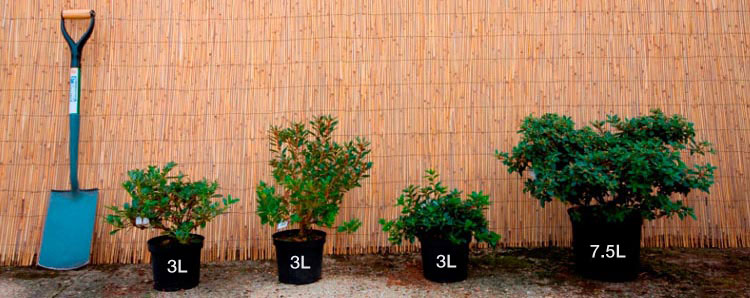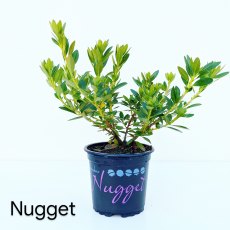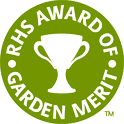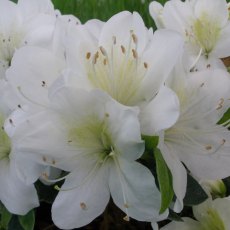Azaleodendron Ria Hardijzer
Item: ARIA
 In stock
In stock
May
Dark Pink
50-75cm
Not Scented
No
To -20 °C
Collect in Store
This item is available for collection.
Home Delivery
UK mainland delivery from £8.95
Lovely small (20mm) vivid purplish red flowers with faint spots in a compact truss of 19 to 25. This is an unusual hybrid between a rhododendron and an evergreen azalea, but it has more of an appearance and habit of an evergreen azalea, though it can look a little sparse in winter. It is worth pruning hard after flowering to keep the plant looking nice and bushy. It is hardy, but dislikes too much heat. Height 60-75cm in 10 years.
- Recommended for striking flowers.
- Easy to grow.
- Group: Azaleodendron.
- Parentage: racemosum (s) X 'Hinodegiri'.
- Hybridization date: pre 2000 (1958).
- Bred by: W.H. Hardijzer. Origin: Dutch.
- Habit: compact
- Ideal position: Most garden situations but avoid too much heat.
- Ideal soil: pH 4.5 to 6.
- RHS Hardiness Rating: H6.
- How we usually propagate this plant: Cutting.
Customer Reviews

Good to know
Azaleodendrons are a group of hybrids between deciduous azaleas and evergreen rhododendrons. They are rarely offered elsewhere, but are generally fully hardy semi-evergreen shrubs which flower in late spring and early summer, sometimes delightfully scented. Azaleodendrons are quite variable, with some looking fairly compact in habit and like an evergreen azalea, and others more upright in habit and nearly bare in winter, like a deciduous azalea.
All require good moist ericaceous soil with a high organic content. For a guide to plant spacing, use the height we give in 10 years as a guide to the distance between each plant. Plant no deeper than the top of the rootball, and dig in plenty of good ericaceous compost around the sides. A teaspoon of slow release feed is sufficient for a 3 litre plant, rising to a small handful for a mature plant.
For further advice, For further advice, see here
The Basics
Ideal soil
Acidic soil, good organic content, pH 4.5-6.0. Inkarho range of rhododendrons will tolerate soils up to pH7.5
Sun or Shade
Light dappled shade is best for most varieties.
Shelter
Refer to hardiness rating. Give young plants protection.
Site Selection
Avoid close to trees, roots, invasive weeds, walls, hot patios, dry banks and waterlogged soils. Do not use weed matting or stone mulch.
Plant spacing
Use the height shown in 10 years as a guide to the distance between each plant. Allow room for plant to fill out. If planting closer for instant impact, be prepared to move plants after a few years.
Compost
- 3 litre pot, dig in 10-20 litres of ericaceous compost.
- 7.5 litre pot, dig in 20-30 litres of ericaceous compost.
- 70-80cm specimen, dig in 60 litres of ericaceous compost.
- 100-120cm specimen, dig in 120 litres of ericaceous compost.
Planting depth
Plant high in the ground, with the top of the rootball visible.
Feeding
Slow-release ericaceous feed recommended in March and straight after flowering.
Mulch
Recommended every few years.
Water
The key ingredient! Keep moist all season, especially the critical time at end of June for flower bud initiation. Tap water is better than no water. Heavy dose at least once per week in dry weather.
Drainage
Ensure good drainage in winter, especially with yellow flowering varieties. Avoid waterlogged sites.
Pruning
Rhododendrons and Camellias: Not normally required. Tidy wayward shoots after flowering.
Evergreen azaleas and Bloombux can be clipped into a low hedge.
Magnolias and Acers: Formative pruning when young to shape into a tree or bush.
Deadheading
Remove old flower-heads, particularly on young or weak plants.
For further advice see here
Size Guide

Delivery & Returns
Our website calculates the delivery charge according to weight and delivery location throughout the UK. To see these charges, please enter your postcode at the checkout, and you will see the charge vary as you add more items to your wheelbarrow.
 Millais Nurseries
Millais Nurseries
















